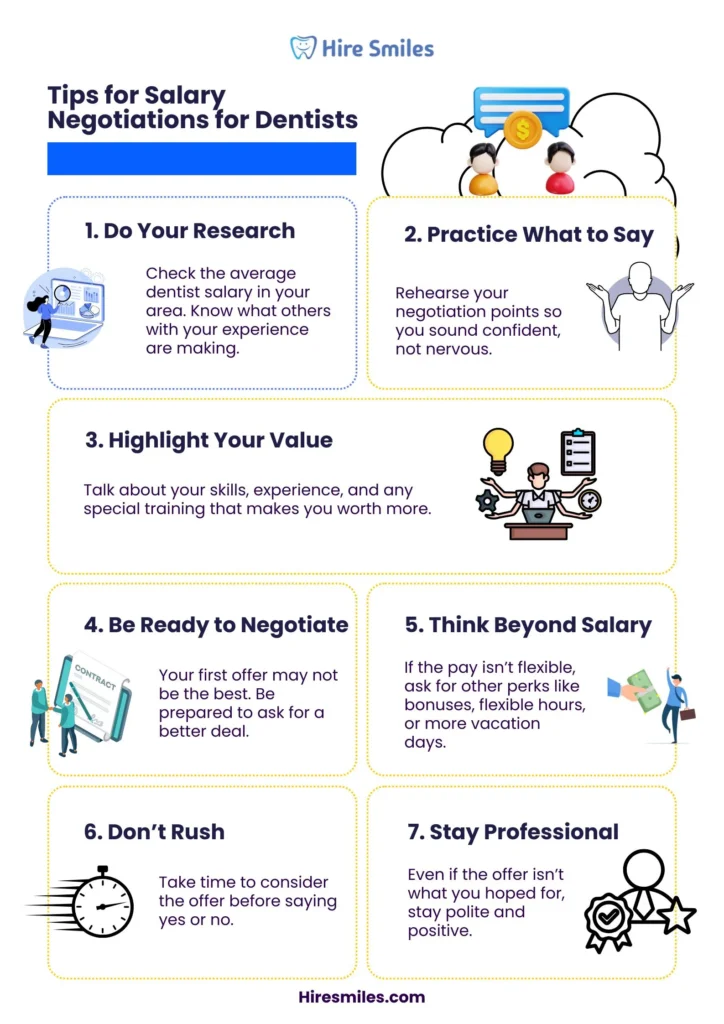Negotiating your salary as a dentist requires preparation and confidence. Start by researching industry standards for your experience, location, and specialization. Highlight your skills, certifications, and any additional training that sets you apart. When discussing salary, focus on the value you bring to the practice, such as patient retention or specialized procedures.
Be ready to negotiate benefits like bonuses, CE reimbursements, or flexible schedules if salary adjustments are limited. Practice your pitch and remain professional throughout the discussion. If the initial offer is low, counter with a well-reasoned proposal backed by data. Most importantly, be willing to walk away if the terms don’t align with your worth. Confidence and preparation are key to securing a fair compensation package. So, take a deep breath, arm yourself with knowledge, and get ready to secure the paycheck you deserve!
Step 1: Know Your Worth
Imagine buying a car without knowing its actual price—sounds risky, right? The same goes for salary negotiations. Before you start talking numbers, research how to negotiate a dentist salary based on:
Your experience level (new grad vs. seasoned pro)
The state or city you’ll be working in (because, yes, salaries differ by location!)
The type of practice (private, corporate, hospital, academia)
Where to Look?
The American Dental Association (ADA) salary reports
Online salary databases like Glassdoor and Payscale
Chatting with fellow dentists (networking is key!)
Step 2: The Art of Timing—When to Bring Up Salary
Timing is everything! If you start talking about money too soon, you might scare off an employer. If you wait too long, you could miss your chance.
Pro tip: Let the employer bring up salary first. If they ask, “What are your salary expectations?” early on, flip the script and ask, “What’s the salary range for this position?” That way, you don’t accidentally lowball yourself.
Step 3: Perfect Your Pitch
Okay, so now you know your worth and have the perfect timing—what next? You need a solid pitch! Here’s what to say:
🔹 Highlight your skills and experience: “With my background in [X], I bring a lot of value to this role.”
🔹 Use data to back up your request: “Based on market research, the average salary for this role is [X].”
🔹 Be confident but polite: “I’d love to discuss a compensation package that reflects my expertise.”
💡 Fun fact: Studies show that people who negotiate tend to earn $1 million more over their lifetime than those who don’t. So yeah, negotiating is kinda a big deal!
Step 4: It’s Not Just About the Salary—Think About Perks!
Your paycheck isn’t the only thing up for negotiation. Consider asking for:
✔️ Signing bonuses (extra cash upfront? Yes, please!) ✔️ Health insurance & retirement plans (because future-you will thank you) ✔️ Paid time off (work-life balance matters!) ✔️ CE stipends (continuing education = more career growth)
Step 5: Watch Out for These Salary Negotiation Traps
🚫 Not doing your research – You wouldn’t go to a dental exam without your tools, right? Same applies here.
🚫 Talking numbers too soon – Let the employer show their hand first.
🚫 Getting too emotional – Stay professional, even if you’re nervous.
🚫 Accepting the first offer immediately – Employers expect negotiations, so don’t say “yes” too fast!
FAQs
What if they say no to my counteroffer?
That’s okay! Ask if there’s room for a future raise or if other perks (like bonuses or extra vacation days) can be added.
Should new grads negotiate their salary?
Absolutely! Even if you’re fresh out of dental school, you still bring skills and potential to the table. Just be realistic and back up your request with research.
How much should I counteroffer?
A safe bet is 10-20% above the initial offer—just be prepared to justify why you deserve it!
Conclusion
Negotiating your salary isn’t about being greedy—it’s about understanding your value and ensuring you’re fairly compensated for your skills, experience, and expertise. As a dentist, your salary should reflect not only your qualifications but also the demand for your specialty, your years of practice, and the unique strengths you bring to the table. A little preparation can make a significant difference in your negotiation process, helping you secure a package that aligns with industry standards and your personal financial goals. So, before you accept a job offer, take a deep breath, do your research, and use these tips to negotiate your dentist salary with confidence and professionalism!
Infographic






